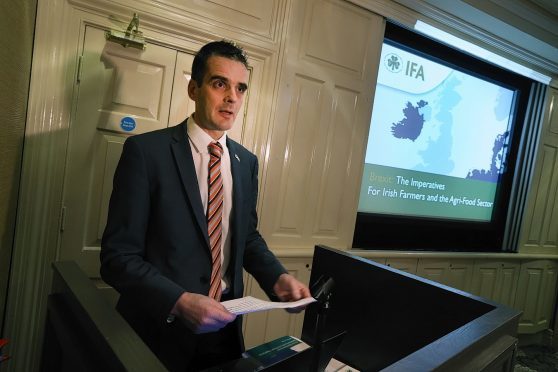Brexit poses the most significant challenge facing the Irish farming and food sector in the history of the state, warns the Irish Farmers’ Association (IFA).
The association’s president, Joe Healy, sounded the warning while launching a new policy paper – Brexit: The Imperatives for Irish Farmers and the Agri-Food Sector.
He said farming had to be the Irish Government’s first priority when negotiating deals with the UK once it leaves Europe, as 40% of the country’s food exports come to the UK.
“Simply put, no other member state and no other sector is as exposed in these negotiations. UK is our closet market, of high value with similar preferences,” said Mr Healy.
“The implications of a hard Brexit are stark: the ESRI estimates a potential reduction of EU trade to the UK of over 60% for dairy and 85% for meat. Translating this to an Irish context would mean a fall of 1.5billion euros (£1.3billion) in meat exports, with dairy exports falling by over 600million euros (£521.5million).”
He said the land border with Northern Ireland meant Brexit had the potential to disrupt trade flows and “undermine animal health co-operation”.
Mr Healy also expressed concern about the implications of Brexit on Common Agricultural Policy (Cap) budgets as the UK is a net contributor.
He called for food and farming to be top of the Brexit agenda at a European-wide level, and not only in Ireland.
“With 22million farmers and 40million related jobs, there is a wider strategic objective here to maximise the future value of the EU farming and food sector,” added Mr Healy.
He called for a comprehensive free trade agreement between the EU and the UK comprising tariff-free trade for agricultural products and food and maintenance of equivalent standards.
IFA livestock chairman Angus Woods said 50% of Irish beef exports were destined for the UK. He said: “It’s a high-value market and consistently pays about the EU average. Any reduction in access to, or the value of the UK market, would have a very negative impact on the Irish beef sector, and potentially the overall European beef market.”
IFA deputy president Richard Kennedy said one third of Irish dairy exports went to the UK in 2016. This included 78,000 tonnes of cheddar cheese, representing 82% of all cheddar imported by the UK.
Mr Kennedy said: “Retention of tariff-free access is critically important, particularly for cheddar exports. The loss of this, or indeed any negative impact on access, could have a destabilising impact on the overall value of the Irish dairy sector.”
The IFA will host a major Brexit event next month with industry leaders, EU Farm Commissioner Phil Hogan and the Irish farm minister Michael Creed.
